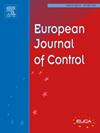Square-root information-type methods for continuous–discrete extended Kalman filtering
IF 2.6
3区 计算机科学
Q2 AUTOMATION & CONTROL SYSTEMS
引用次数: 0
Abstract
In this paper, we derive several square-root information-type Extended Kalman filtering (EKF) methods for continuous–discrete stochastic systems. Square-root implementations are known to improve the numerical stability of the EKF (to roundoff), meanwhile, the information-type algorithms are the powerful estimation tools in case of limited or unknown a priori information about the state. Our continuous–discrete EKF methods are designed by using the Euler–Maruyama discretization scheme as well as the Cholesky and SVD factorizations for the square-root implementations. Unlike discrete-time information-type EKF methods, which rely on the invertibility of the Jacobian matrix of the process equation drift function, the continuous–discrete information-type EKF algorithms avoid this restriction. They exist for any Jacobian matrix value when the step-size (given by users) of the numerical integration scheme involved is sufficiently small. This makes the novel continuous–discrete information-type EKF algorithms more flexible and provides a good reason for using them in practice. Finally, the numerical tests include two benchmark problems from chemical engineering field and one example from mathematical neuroscience, respectively. The results obtained demonstrate the practical significance of novel information-type EKF implementation methods and their feasibility.
连续离散扩展卡尔曼滤波的平方根信息型方法
本文给出了连续离散随机系统的几种平方根信息型扩展卡尔曼滤波(EKF)方法。众所周知,平方根实现可以提高EKF的数值稳定性(舍入),同时,信息类型算法是在关于状态的有限或未知的先验信息的情况下的强大估计工具。我们的连续离散EKF方法是通过使用Euler-Maruyama离散化方案以及平方根实现的Cholesky和SVD分解来设计的。与依赖于过程方程漂移函数的雅可比矩阵可逆性的离散信息型EKF方法不同,连续离散信息型EKF算法避免了这一限制。当所涉及的数值积分格式的步长(由用户给出)足够小时,它们对任何雅可比矩阵值都存在。这使得新的连续离散信息型EKF算法更加灵活,并为其在实践中的应用提供了很好的理由。最后,分别用化学工程领域的两个基准问题和数理神经科学领域的一个算例进行了数值测试。研究结果证明了新型信息型EKF实现方法的现实意义和可行性。
本文章由计算机程序翻译,如有差异,请以英文原文为准。
求助全文
约1分钟内获得全文
求助全文
来源期刊

European Journal of Control
工程技术-自动化与控制系统
CiteScore
5.80
自引率
5.90%
发文量
131
审稿时长
1 months
期刊介绍:
The European Control Association (EUCA) has among its objectives to promote the development of the discipline. Apart from the European Control Conferences, the European Journal of Control is the Association''s main channel for the dissemination of important contributions in the field.
The aim of the Journal is to publish high quality papers on the theory and practice of control and systems engineering.
The scope of the Journal will be wide and cover all aspects of the discipline including methodologies, techniques and applications.
Research in control and systems engineering is necessary to develop new concepts and tools which enhance our understanding and improve our ability to design and implement high performance control systems. Submitted papers should stress the practical motivations and relevance of their results.
The design and implementation of a successful control system requires the use of a range of techniques:
Modelling
Robustness Analysis
Identification
Optimization
Control Law Design
Numerical analysis
Fault Detection, and so on.
 求助内容:
求助内容: 应助结果提醒方式:
应助结果提醒方式:


